TMW #150 | The search mutiny
Welcome to The Martech Weekly, where every week I review some of the most interesting ideas, research, and latest news. I look to where the industry is going and what you should be paying attention to.
👋 Get TMW every Sunday
TMW is the fastest and easiest way to stay ahead of the Martech industry. Sign up to get the full version delivered every Sunday for this and every TMW, along with an invite to the TMW community. Learn more here.
The search mutiny
The Roman Roads were ancient Rome’s most important invention. It was a network of interconnected arterial roads that could carry soldiers, news, culture, ideas, and trade, stretching 250,000 miles from Britain to Egypt. It’s where we got the “all roads led to Rome” saying. It was also the mechanism that brought about “Pax Romana” – a period of relative prosperity and peace for 200 years across the Roman empire.
You could have been Greek, Christian, Ethiopian, or an Israeli Jew, and if you had the right certificates you could, like Paul the Apostle did, travel all the way from Jerusalem to Rome, safe in knowledge that you wouldn’t be in danger of thieves or barbarians. People still use them; a testimony to the Roman government of the day’s enduring influence to connect people, ideas, and trade.

Today, the closest we have to our own Roman Roads is Google Search: the technology that similarly connects a varying share of trade, ideas, information, and people. Unlike the Roman Roads that connected countries in the Mediterranean, it has connected the entire world. But like it, you can feel safe that, most of the time, what you’re getting on Google Search is somewhat accurate, and lead you to somewhere useful.
And like the Roman Roads that are in use even today, somehow Google Search continues to endure anything the industry throws at it.
Like last week, where news broke that Reddit is mulling over a potential pull out of Google Search in favor of building their own, alternative version of a search product. This is an interesting play for Reddit, which is nowhere near the kind of scale to parallel the major online platforms, but signals a larger shift away from reliance on Google’s business model and a move to a more data-rich and defensible business model. Why should Google have all the fun?
Nothing has happened yet of course. But if Reddit did go down this path, it would be against the tide of how other platforms are working with Google. TikTok has decided not to pursue an option to create an alternative search product based on video, and has instead decided to partner with Google to enable search on their platform. The company that was supposed to disrupt Google Search, Neeva, went bankrupt and was sold for scraps to Snowflake a couple of months ago. In the recent Q3 2023 Alphabet results, Google Search Revenue increased by $4.4 billion year on year – not bad!
Yet despite this incredible growth, and the ability to turn even some of the fiercest contenders that could replace search to Google’s side, it does make me wonder - is the value of allowing Google’s search crawler on your website diminishing?
Companies like Reddit are seeing the writing on the wall, the open web is slowly closing in around us, and what we’ll have instead is a series of fiefdoms that control parts of the consumer’s search experience. Companies that are rich in media, content and products could easily pull away from Google and create more opportunities for themselves to be the first port of call for search.
With third-party cookies and increased data privacy regulation for data management, does it even make sense, if you have a ton of website traffic and consumer data, to keep letting the proverbial fox in the chicken coop?
Well, there’s a reason why this hasn’t happened sooner.
Resisting inertia
Most people use Google Search. And the reason they use it is because everyone else uses it. And the reason why everyone else uses it is because you use it. Google is ingrained in our intellectual and informational habits so deeply, it would take an entire generation to change the landscape. This is a simplified concept for why Google has so much power; search is a self-reinforcing optimization loop that continues to get better as more people use the product:
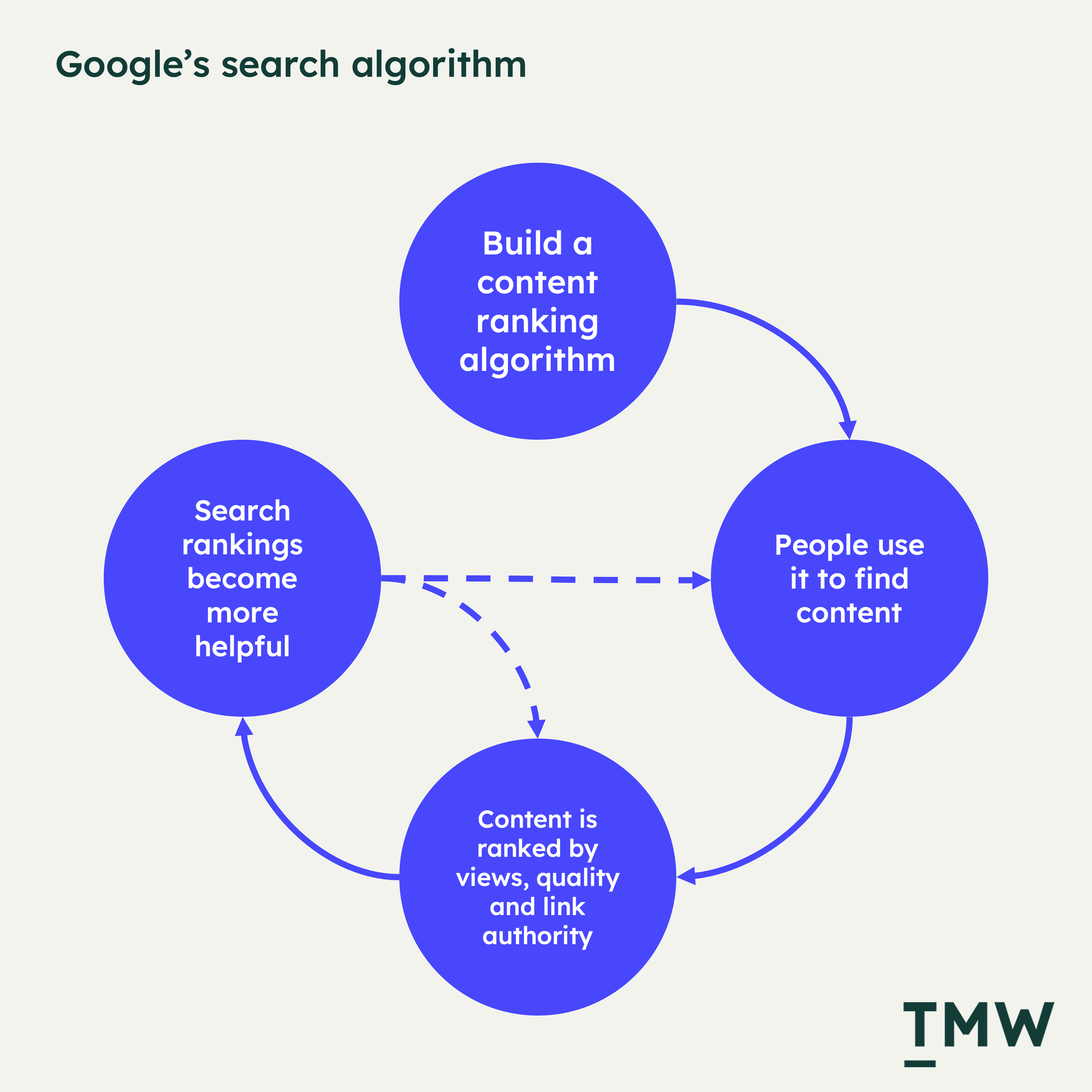
It’s the epitome of the proverbial “verbing” of a tech product – you just Google it. And it’s firmly in our mindset and culture. It took a generation to learn it, and it will take a generation to unlearn it.
And right now, it seems like there’s nothing but growth for Google’s golden calf, the product that drives more than 70% of Google’s advertising revenue as of last quarter:
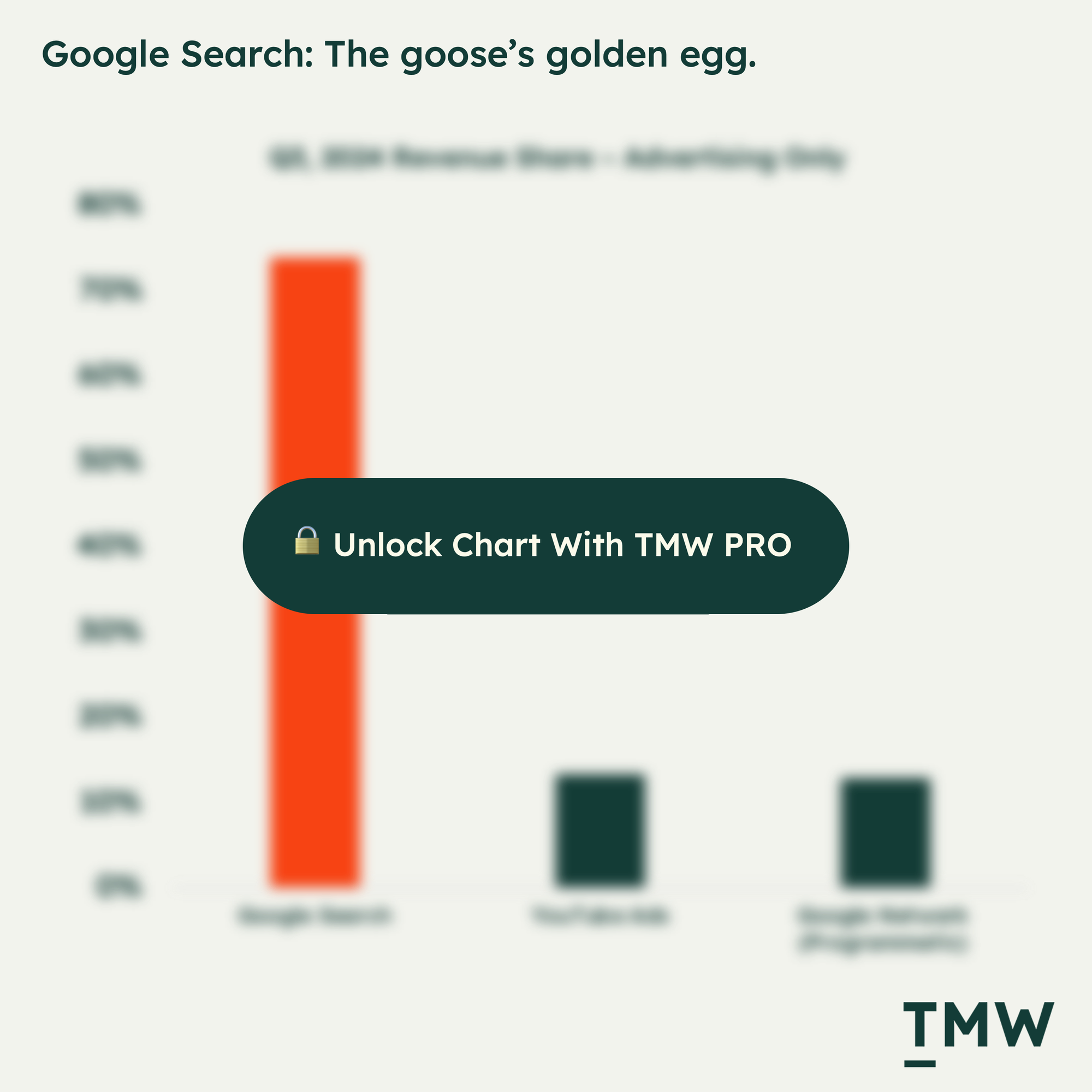
Or about 30% of all of Alphabet’s revenue across all products and services. Which, despite how many products Alphabet has launched and killed along the way, is still so central to the business.
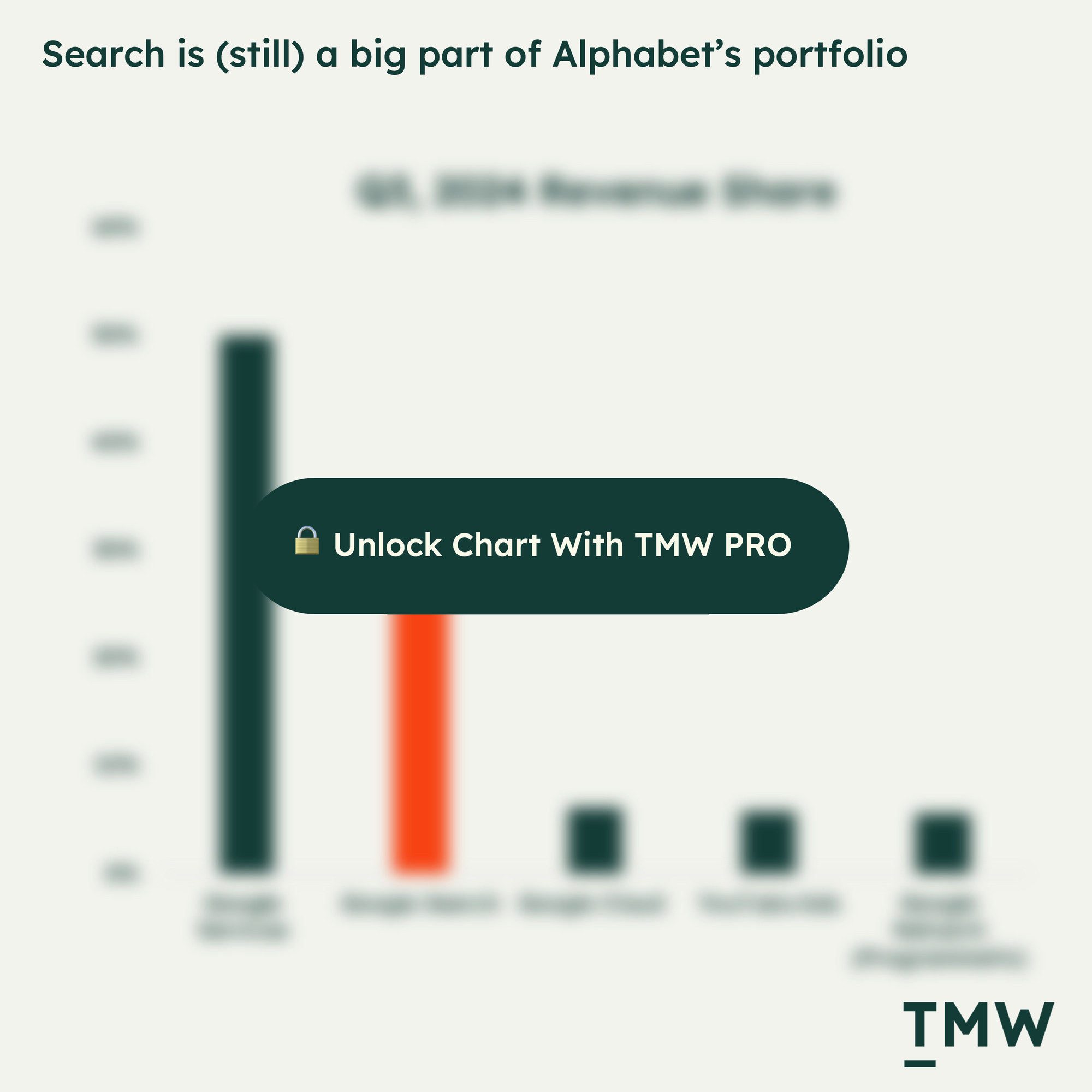
Close to 50% of all online ad revenue from the major platforms flow to Google. Google is an impenetrable fortress that seemingly prints money with minimal friction, turning freely obtained content into an infinite money glitch.
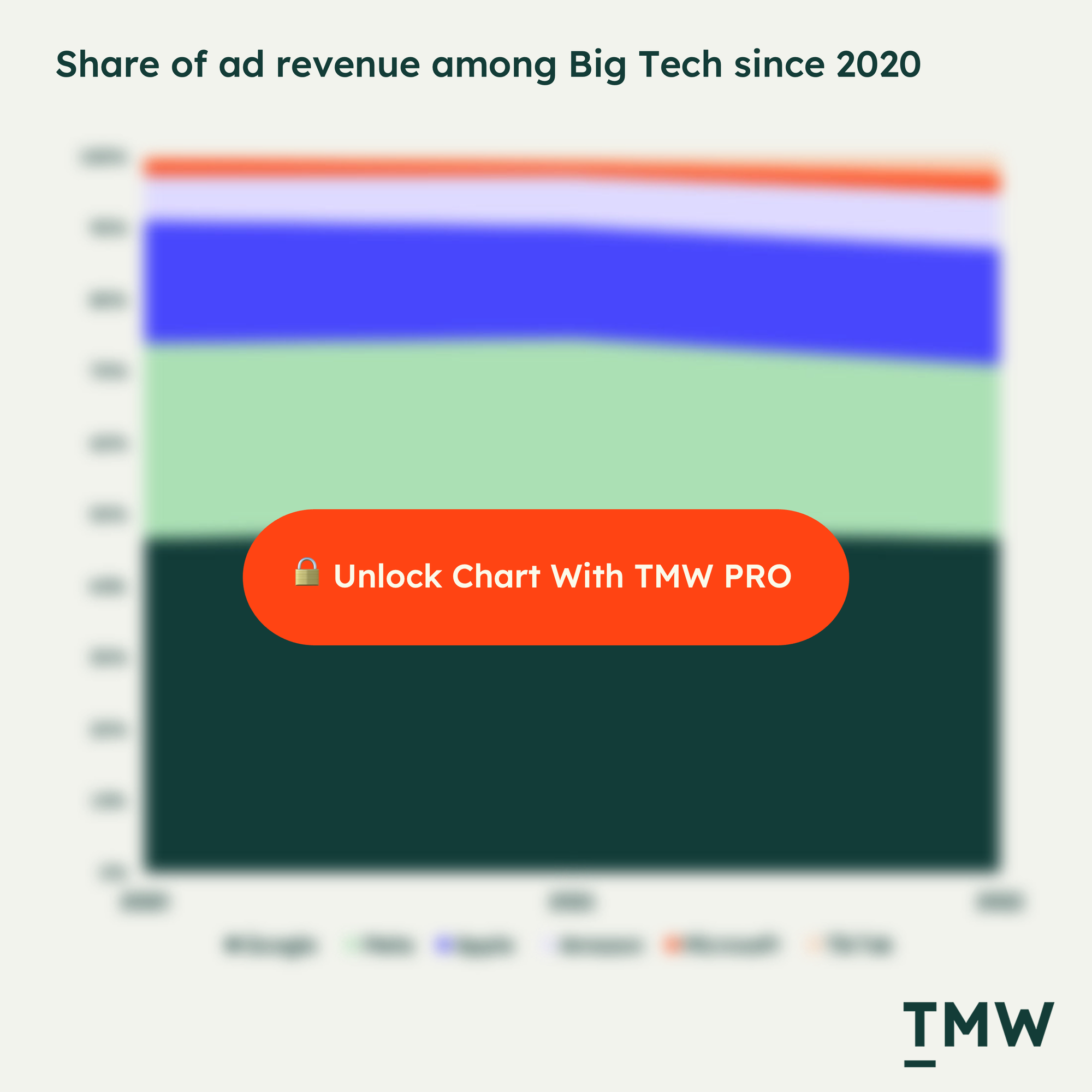
But this could change with time as Search continues to squeeze revenue out of every conceivable free space on the search page. As the alignment drifts from users to advertisers people will be wanting something new.
Sergey Brin and Lawrence Page wrote this in their Stanford thesis paper back in 1994, which is about as close to fortune-telling as you can get in tech:
“Currently, the predominant business model for commercial search engines is advertising. The goals of the advertising business model do not always correspond to providing quality search to users. For example, in our prototype search engine one of the top results for cellular phone is "The Effect of Cellular Phone Use Upon Driver Attention", a study which explains in great detail the distractions and risk associated with conversing on a cell phone while driving. This search result came up first because of its high importance as judged by the PageRank algorithm, an approximation of citation importance on the web [Page, 98]. It is clear that a search engine which was taking money for showing cellular phone ads would have difficulty justifying the page that our system returned to its paying advertisers. For this type of reason and historical experience with other media [Bagdikian 83], we expect that advertising funded search engines will be inherently biased towards the advertisers and away from the needs of the consumers.”
It's that last sentence that we’re experiencing today, as it seems like Google Search-promoted listings seem to be getting longer and longer, with content that is actually helpful being pushed to page two – the no man’s land of content. But it’s not only advertisers; the SEO industry exists to learn and hack the ranking algorithms, so instead of getting something that is specific to your needs, you get a page that was optimized ruthlessly for rankings by some 20-something agency dude in a coworking office downtown.
But this isn’t really about consumer demand at all. Even though the mental default for finding information online is Google Search, that too can be shifted. After all, people over a 20-year time span abandoned other ways to gather information online – like using the Yellow Pages or going to a library to find books – to using search and websites. So, too, will the paradigm shift again. It’s just a matter of time, incentives, and something better.
One of those shifts is how we interact with information, not just find it. OpenAI recently announced the ability to upload PDFs, code, and multiple points of information including photos, audio – and I’m sure soon-to-be video – to get better answers for things. Without hallucination and with accurate information, this is by far superior to Google Search, in only that it is multi-modal – you can now send a screencap of a book quote and ask who wrote it, or to use OpenAI’s example, send a photo of your bike seat and it will tell you how to fix it.
It could very well be the end of text-based search as the dominant paradigm of the internet. And OpenAI might be able to bring it and disrupt the consumer inertia. It’s still too early to say though. Microsoft’s attempt to disrupt Google with the New Bing earlier this year hasn’t made a dent against Google Search’s market share. In fact, it’s lower than in 2022. #facepalm
Perhaps the new verbiage will come with ChatGPT as the next consumer paradigm for doing a thing on the internet.
And in the backdrop of Reddit’s potential mutiny against Google Search is a concern that it’s not only Google crawlers making good use of Reddit’s community content, but also that other AI crawlers like those from OpenAI that are also indexing their content, which triggered this entire situation with Reddit along with a stack of other media and news publishers.
Generative AI seems to have crossed some red line from content indexing to active referencing for creation. And media companies are reluctant to let yet another fox in the hen house with even less chickens.
But that’s the least of our problems. While AI could disrupt Google and wake the general public up out of their inertia, it’s the incentive structure Google relies on that is the more powerful element to how search changes over time.
Paying to be in the game
Another thing that keeps Google the incumbent is its browser (Chrome) and its funding of other devices to the tune of billions of dollars to remain the default search experience. I often wonder what the internet would look like if Apple developed and shipped its own search engine. Or if Google was never allowed to ship a browser. Perhaps we would have a much more balanced internet, or it could be horribly worse. We will never know.
As I mentioned in the internet according to Apple, Google’s strategy has been to fund device lock-in for close to a decade. And it worked:
“Apple has indirectly and directly benefitted from the Adtech industrial complex for as long as the internet has been around. One data point that signals this is how much Google pays Apple every year to allow Google Search to be the primary search engine on all iOS devices. For over 15 years, the cost has been steadily rising, with Matthew Ball expecting it to rise to $20 billion in 2023 – a full 25% of Google’s net income.”
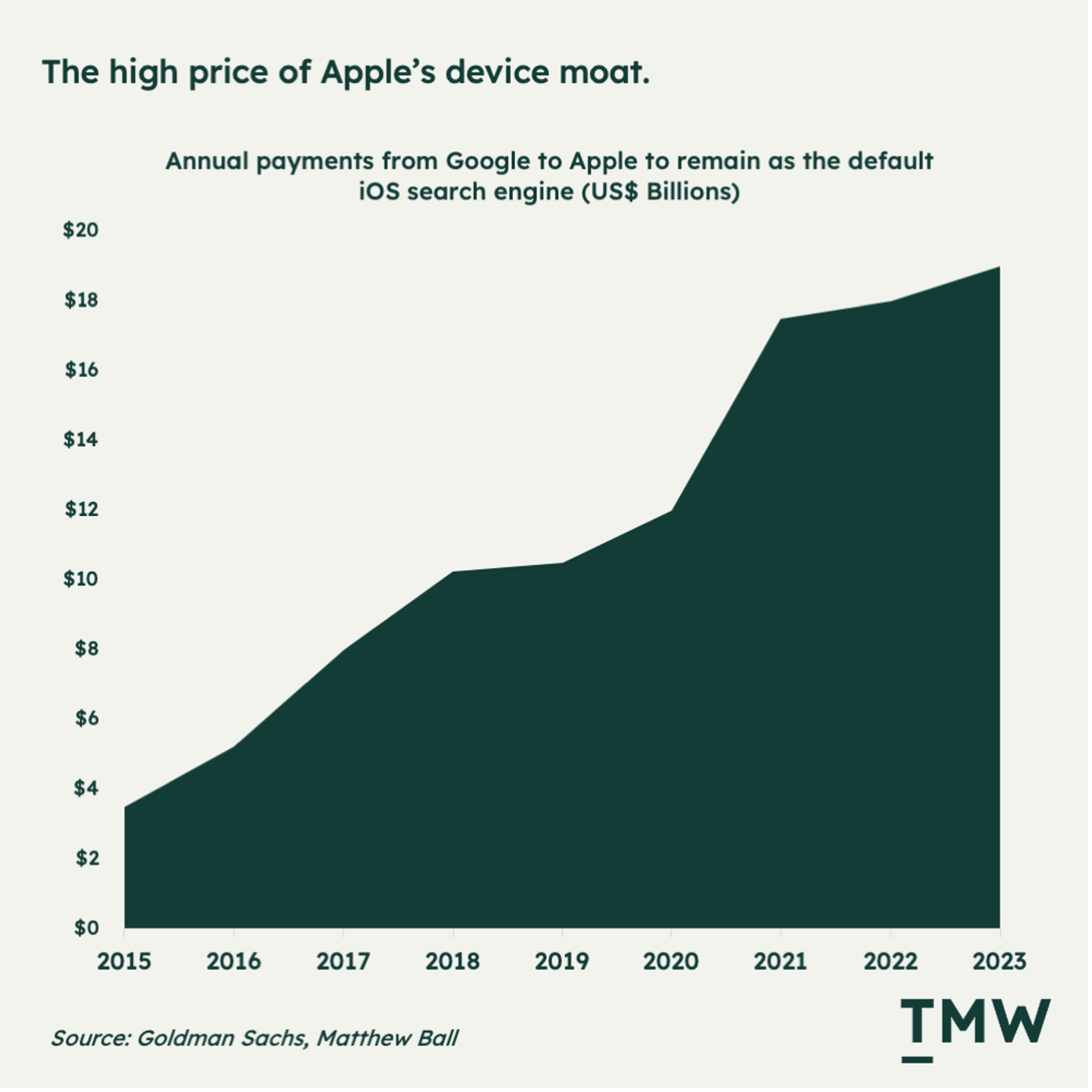
But like a local store owner paying the mafia for protection, so does Google pay Apple for the right to default Safari to Google Search. Something you can change yourself, but many won’t even bother. It now makes sense why Google continues to invest in building premium smartphones; it’s really just the cost of goods for search, the real high-margin business worth protecting.
Chrome isn’t the default browser on desktop devices, but Search still is the default for Safari, while Bing is the default for Microsoft. But the Chrome browser remains the default for many computers, enjoying a 65% market share.
The challenge here is that paying other OS and OEMs to stay on top doesn’t last, and it shouldn’t – the game is rigged for the incumbent with the capital available to make these huge payments. With the looming DOJ antitrust case result, we may see a big shift in what Google can and cannot operate on the web. Chrome could be a causality.
So Google is paying a high price to keep that inertia in place; if it’s building a smartphone device category from scratch, or paying Apple billions of dollars to stay in the iOS family, you can see that a situation where Reddit exiting Google makes no sense at all – there’s no way to compete meaningfully.
The river runs dry
The biggest threat to Google by far is the major content-producing platforms and websites just shutting off access to Google completely. In the short term, it won’t do much at all; but in the long term, as cheap content starts to dominate search, the recursive training of generative AI garbage fills websites and newsfeeds and high-quality sources of information becomes scarce, Search will become even more reliant on high quality sources and brands.
This was the argument of the New Media Bargaining Code, Canada’s “link tax,” and a new bill in California, where high-quality news publishers became unwitting but necessary mules in the enrichment of Google. Google can run ads against search results, while publishers can only run ads on the content on its site. It’s like setting up a music festival and telling all the musicians they can play for exposure, but the festival keeps all the ticket fees. It will only attract bad musicians who need the exposure.
No wonder Reddit is thinking about taking a left turn. Why continue to feed a machine when it could just build its own value proposition? After all, Google is an empty shell without content, and if Google doesn’t do something to placate high-quality journalism, then why not go somewhere else with your business? After all, Alphabet is a private corporation last time I checked, and Google is not a public service, but it sure does act like one.
There are alternatives like DuckDuckGo (which receives 100m daily queries per day) and more ethical-focused products like Yep, backed by AHREFs promise to pay creators for the content that is indexed on its platform. Amazon already takes the lion’s share of product searches on the web because of the unique e-commerce data model that pertains to products that are specific to the platform. And the App Store is kind of like a browser in its own right. With more than 500 million users visiting the App Store every week, finding apps is more effective and easier in the store, and because searching for apps is integrated into the spotlight feature – users don’t even need to launch an app to find something.
All of the above are worth our time, but in reality they just cannot compete with the Search monolith. All of them are fractured and siloed into a specific data category or OS value proposition; nothing is as generalized as Google.
But still, the opportunity exists in the weakness of the Search business model: its total reliance on other companies to create content for it. Imagine if Disney, Netflix, Amazon, Wikipedia, Meta, Snap, Baidu, LinkedIn, Reddit, and the 535 news organizations that have decided to no longer allow their content to be scraped by online platforms decide to leave Google.
It could lead the charge and trigger a Google exodus. Developers in unison would add the noindex: <meta> tag to their sites to ban Google from indexing their site. We’d have to search on different websites for different things, we would be frustrated and a little inconvenienced, Google would lose its stranglehold over our information, and it will be glorious! Let the river of free indexable content run dry!
And yet, I have mixed feelings about the role of Google in our daily lives. It’s such a wonderfully efficient way for marketers to get customers – especially for consumer goods and services – that it really has a lot of value in accessing most people on the internet.
The other side of me thinks that no company should have that much influence nor power over our information, no matter how much they say they are not evil. And as I’ve argued for quite a while now, a private web is also a siloed internet, and a siloed internet is harder to navigate.
So perhaps we’re stuck with a zero-sum situation. We lose a lot without a single focal point for search, but we also lose more when it means that no other companies can build in a domain that has more or less gone dormant over the past 15 years, because no company can get close to anything resembling Google Search – the unassailable, and most impenetrable product in the world.
Perhaps, like the Roman Road, Google will last 2,000 years and forever more. Well, at least long after we’re all dead and gone.
Stay Curious,
Make sense of marketing technology.
Sign up now to get TMW delivered to your inbox every Sunday evening plus an invite to the slack community.
Want to share something interesting or be featured in The Martech Weekly? Drop me a line at juan@themartechweekly.com.
